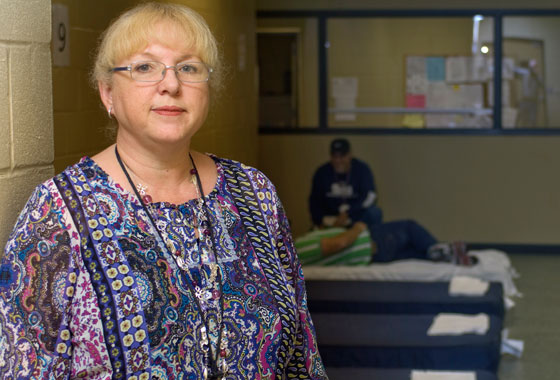
Class Notes
Melanie Lane, M.S.W. ’09
Focus on recovery
Melanie Lane has two words for people struggling with issues of substance abuse: "Treatment works."
Lane, already an experienced substance abuse counselor when she entered the master’s in social work program in 2004, is the unit coordinator at the Restoration Center, a program of the Center for Health Care Services that is located on the new Haven for Hope campus in downtown San Antonio. In addition to a detox and intensive outpatient treatment unit, the Restoration Center includes a public sobering component, a relatively new idea in substance abuse treatment. Instead of booking public intoxicants into jail, police and sheriff’s deputies now drop them off at the Restoration Center, provided they’re not a danger to themselves or others.
"A lot of this is about jail diversion," Lane says of her work, noting that more than 3,000 public intoxicants have been treated at the center since July 2008. "Why are we putting people in jail at a huge cost to taxpayers, when what they really need is treatment? Their crimes are related to their addiction."
Lane works with chronic alcoholics and other substance abusers, many of whom are homeless, who come in to the Restoration Center on their own or are brought in by law enforcement.
"We try to talk them into making a commitment," Lane says. "We use motivational interviewing. It’s based on the philosophy that recovery is a process. The goal is to keep them engaged and coming back until they are ready to buy into a long-term treatment program."
The Restoration Center is a community partner with Haven for Hope. When it is completed in 2010, the 37-acre Haven for Hope campus will include nearly 1,000 beds and a courtyard with the capacity to sleep more than 500 additional individuals. More than 70 partner agencies will provide critical services to the homeless. Lane says that San Antonio is considered a model nationally for its integrated approach to addiction and behavioral issues that links law enforcement with detox and treatment, housing, medical needs and other services.
A licensed chemical dependency counselor for 15 years, Lane brings a real and personal passion to her work—she was once homeless and is in recovery for substance abuse herself.
"My last drink was Jan. 15, 1991. Who would have ever thought that I would have changed my life the way I did?" says Lane.
Much of Lane’s work experience took place at Alpha Home Inc., a recovery facility for women with chemical addictions. In fact, Lane worked at Alpha Home while in graduate school. "UTSA was a huge asset," she says. "Their program was affordable for me. All the classes were on nights and weekends, which fit my schedule … and it was a brand new program. Their thinking is new and modern and innovative. They trained us to be global social workers. A lot of the training was on cultural diversity in social work.
"It’s a great program. I felt really privileged to be a part of it."
Lane recently passed her licensing exam, and feels she’s found her place at the Restoration Center. "This is what I’ve been working for my whole life," Lane says. "I have a chance to make an impact—to apply my knowledge to such a worthy cause in the community."
— Joe Michael Feist and Lynn Gosnell
